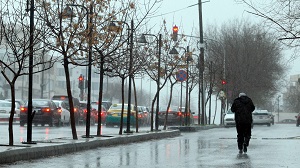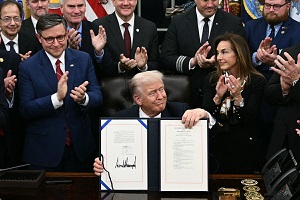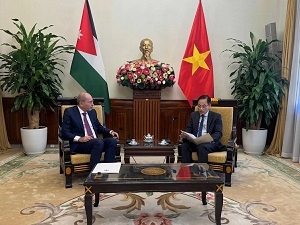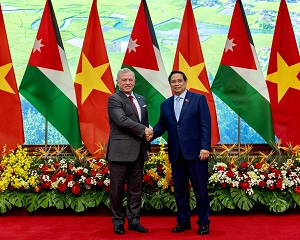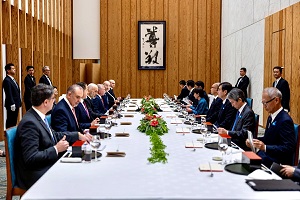A new geopolitical paradigm - By Michael Jansen, The Jordan Times
The visit this week of Syrian President Ahmed al-Sharaa to the White House could mark a turning point in traditionally unstable US-Syrian relations. This visit, the first ever to the US by a Syrian president since the country's independence in 1946, put an end to Syria's journey from the cold embrace of Russia and Iran, the two external powers which supported the ousted Assad regime.
Just to be on the safe side, last month Sharaa also travelled to Moscow where he met with his Russian counterpart Vladimir Putin. This was their first encounter since the fall of Assad and revealed that Damascus and Moscow remain determined to maintain close ties. While there Sharaa stated that previously signed agreements with Russia would be respected, indicating that Russian troops and sailors could remain at their bases in Syria. Sharaa clearly intends to balance allies between east and west to retain a certain degree of freedom of action.
The White House visit also capped Sharaa's own transformational journey from al-Qaeda warrior fighting the 2003 US occupation of Iraq, his five years in a US prison, and relegation to the northwest Syrian province of Idlib where he prepared the putsch against President Bashar al-Assad and the takeover of Syria.
The first US-led coup in this region took place in Syria in March 1949 when the Syrian army overthrew President Shukri al-Quwatli who was accused of purchasing inferior arms for the Syrian army ahead of the 1948 war with Israel. The officer behind the coup was Hosni Za'im who was overthrown that year, ushering a series of coups d'état until Hafez al-Assad ended the upheavals in 1970 and established a regime which lasted until December 2024 when Sharaa's Haya't Tahrir al-Sham (HTS) ousted Assad.
Under the Assads, Syria adopted domestic socialism and a line independent of the US in foreign policy by turning toward on Russia and Iran. After the 2011 regional unrest began they tried to defend the Assads from dissidents like HTS which established itself in Idlib and with the protection and aid of Turkey took power in Syria in a bloodless coup. Sharaa can still count on backing from NATO power and US ally Turkey, a fact which irks Israel.
Sharaa's visit to the White House has not only boosted his personal position but enabled Trump to press Congress to lift anti-Assad sanctions under the Caesar Act to enable Syria to raise investments to rebuild its economy and infrastructure after nearly a decade of unrest and financial collapse. Although the number of Syrians who lived in poverty was 33 per cent before unrest erupted in 2011, the figure now is 90 per cent. The US Treasury Department said it "will support Syria’s efforts to rebuild its economy, provide prosperity for all its citizens, including its ethnic and religious minorities, and combat terrorism.”
Syria has formally joined the 89-member international coalition to defeat Daesh (Islamic State). Trump and Sharaa discussed the integration of the US-backed Kurdish Syrian Democratic Forces (SDF) into the Syrian army as the SDF has been the most successful militia in the war against Daesh. This has, so far, been resisted by the SDF although under US and Turkish pressure the SDF could be compelled to merge. However, this could be difficult with the largely fundamentalist forces commanded by Sharaa.
On the domestic front, Sharaa must stabilise Syria by imposing law and order although it would appear that his military and police forces are undermanned and overstretched. Consequently, in Syrian cities and rural areas there is low level street violence involving car jackings and robberies. His security forces have apparently cracked down on fundamentalist elements who earlier attacked southern Druze and coastal Alawite areas.
In a key diplomatic shift, the US has announced the official reopening of the Syrian embassy in Washington, ending more than a decade of diplomatic absence. After the presidential meeting, Syrian Foreign Minister Asaad Al-Saibai and US Secretary of State Marco Rubio held discussions to outline the implementation of the agreed-upon initiatives. It would appear that time will not be wasted while advancing relations.
